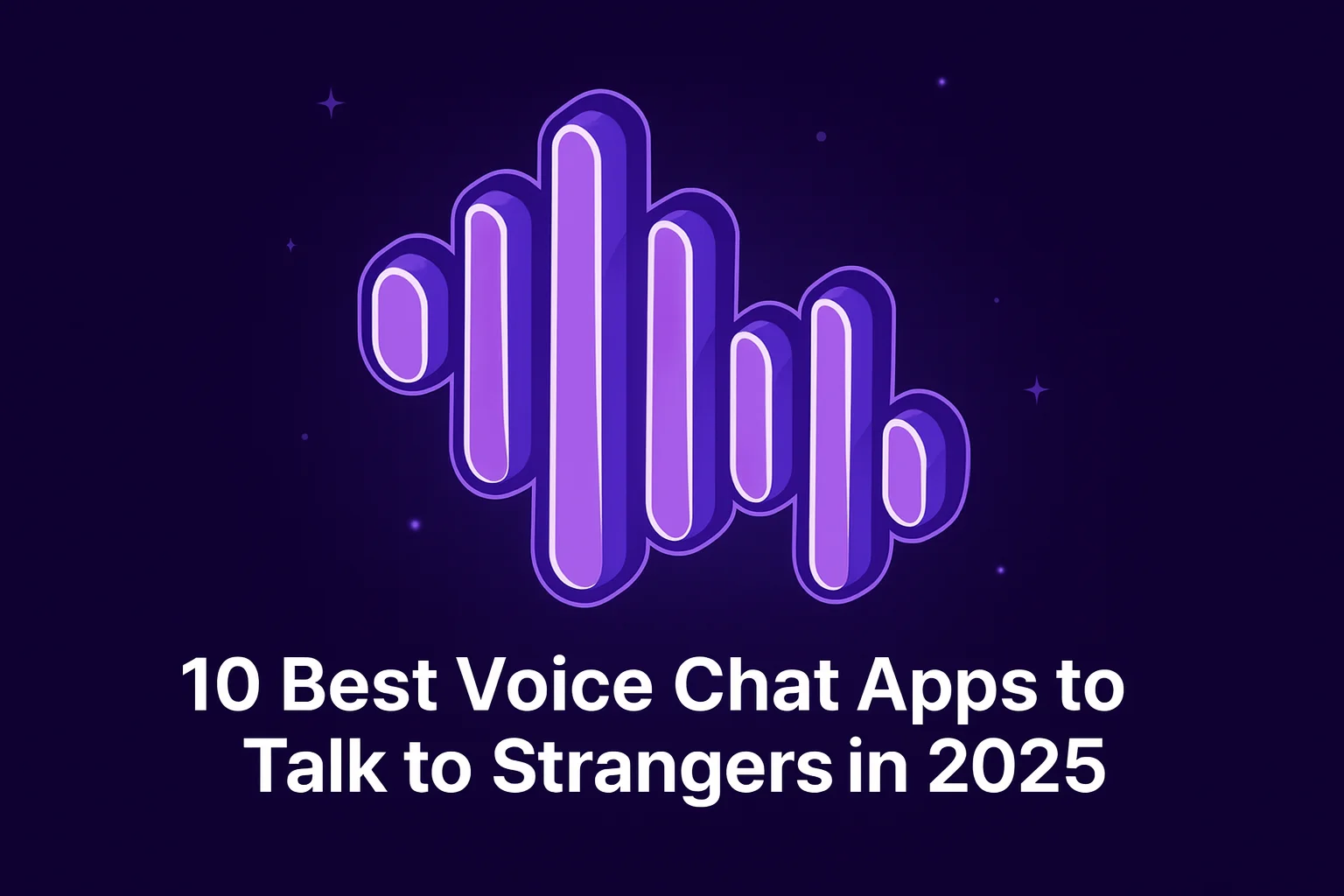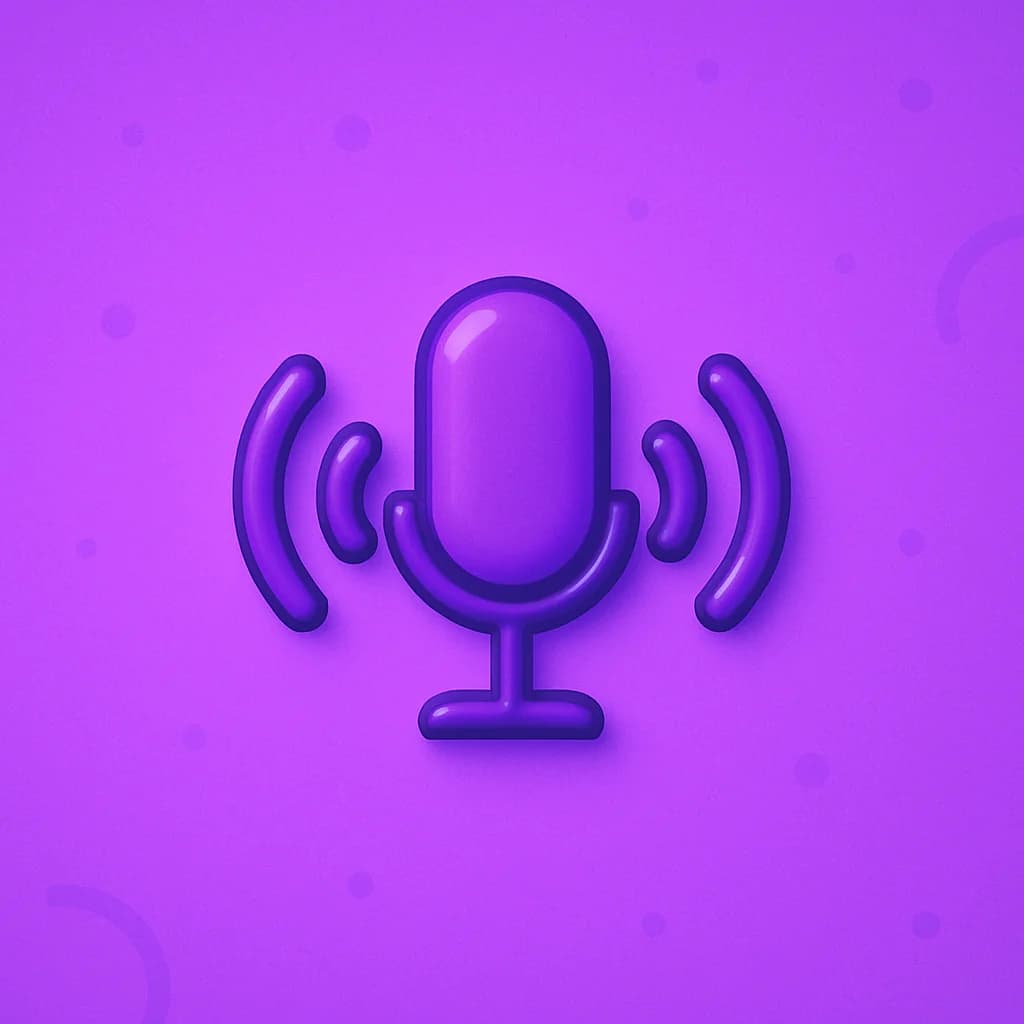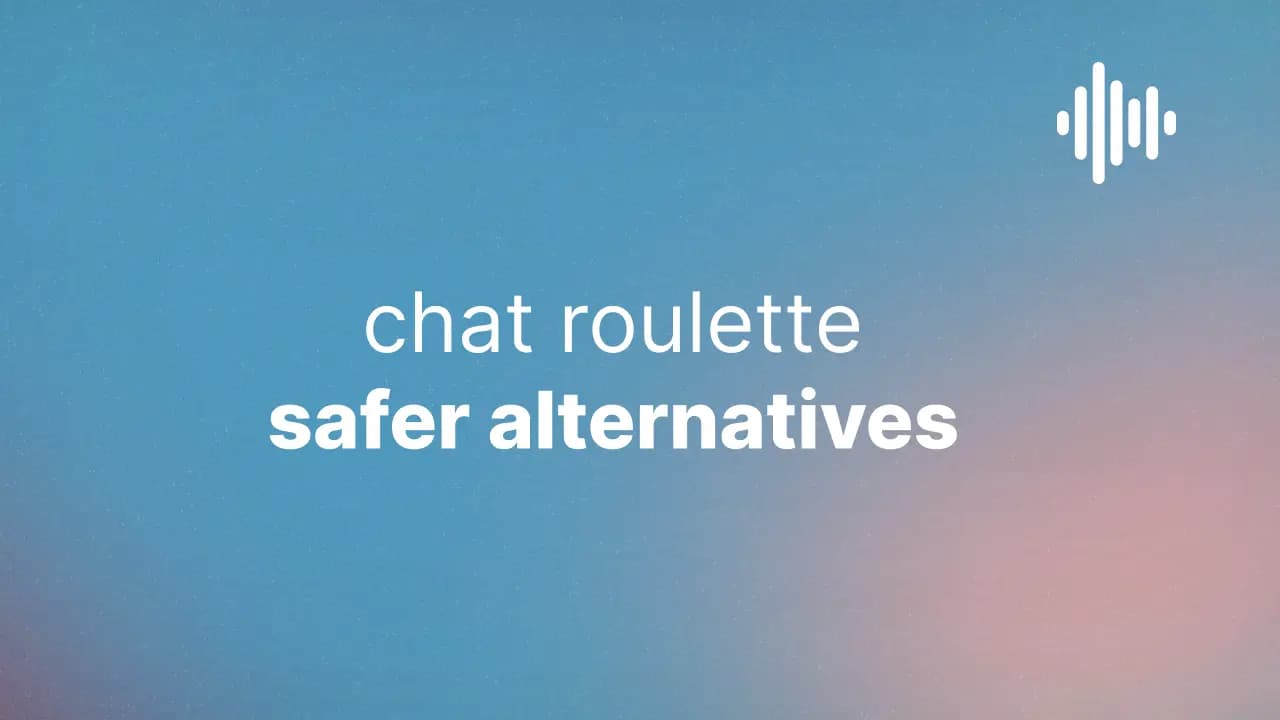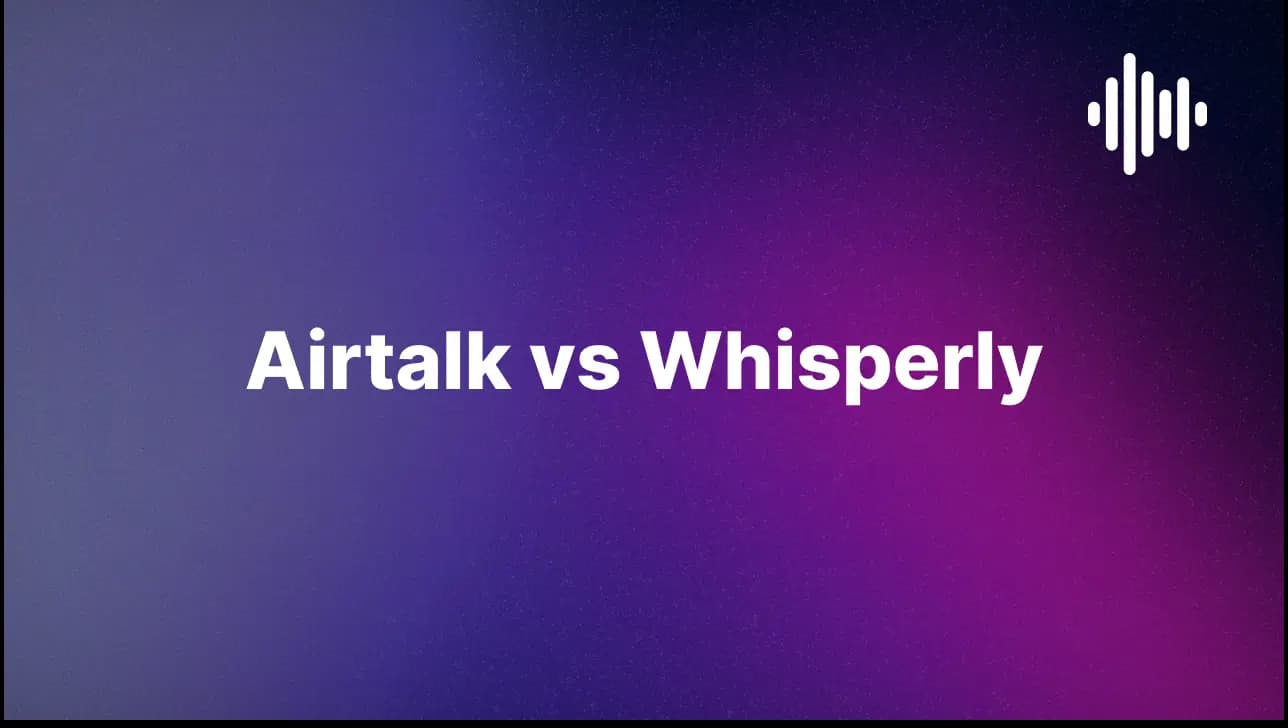Summary
In 2025, over 300 million people worldwide use voice-first platforms weekly to connect with strangers and ease loneliness. This comprehensive guide reviews the 10 best voice chat apps for talking to strangers, from established platforms like Clubhouse and Discord to emerging solutions like Whisperly. Each app is evaluated for safety, anonymity, user experience, and community quality, helping you find the perfect platform for meaningful voice connections.
In 2025, over 300 million people worldwide use voice-first platforms weekly — not for meetings, but to connect with strangers and ease loneliness (Statista, 2024).
Text and video chat apps feel either too shallow or too risky. You want real connection, but most platforms either lack safety measures or create performance pressure that kills authentic conversation.
This list shows the best voice chat apps to talk to strangers in 2025 — platforms that balance safety, anonymity, and genuine human connection.
Table of Contents
- AirTALK – Casual Random Voice Chat
- Yalla – Group Voice Chat Rooms
- Wakie – Themed Conversations
- Clubhouse – Social Audio Rooms
- Discord Servers – Niche Communities
- Azar Voice – Translation Features
- Maum – 1-on-1 Anonymous Chats
- Threema Calls – Privacy-First Messaging
- Omegle Alternatives – Still Active
- Whisperly – Late-Night Voice-Only App (Live Now)
- Expert Insights on Voice Chat
- Safety Tips for Voice Chat
- Frequently Asked Questions
1. AirTALK – Casual Random Voice Chat
AirTALK offers instant, random voice connections with strangers worldwide. The platform focuses on simplicity and speed, matching users within seconds for quick conversations.
| Feature | Details |
|---|---|
| Matching Speed | Instant (under 5 seconds) |
| Anonymity Level | High – no profiles required |
| Safety Features | Basic reporting, easy disconnect |
| User Base | Global, mixed demographics |
Pros:
- Easy, instant matching process
- No registration required
- Global user base
- Simple, intuitive interface
Cons:
- Limited safety controls
- No conversation history
- Basic moderation system
- Occasional connection issues
2. Yalla – Group Voice Chat Rooms
Yalla dominates the Middle Eastern market with its group voice chat rooms and social features. The platform combines voice chat with gaming elements and virtual gifts.
| Feature | Details |
|---|---|
| Room Types | Public, private, themed rooms |
| User Capacity | Up to 50 people per room |
| Monetization | Virtual gifts, premium features |
| Primary Market | Middle East, North Africa |
Pros:
- Large, active communities
- Diverse room topics
- Gaming integration
- Strong regional presence
Cons:
- Heavy advertising
- Less privacy-focused
- Language barriers
- Premium features required for best experience
3. Wakie – Themed Conversations
Wakie specializes in themed conversations and wake-up calls, connecting people based on shared interests and time zones. The platform emphasizes meaningful dialogue over random encounters.
| Feature | Details |
|---|---|
| Matching System | Interest and time-based |
| Conversation Types | Wake-up calls, themed chats |
| Duration | 5-60 minute sessions |
| Safety | Moderate moderation |
Pros:
- Topic-based matching
- Unique wake-up call feature
- Focused conversation topics
- Time zone awareness
Cons:
- Hit-or-miss conversation quality
- Limited user base in some regions
- Requires more setup than random chat
- Premium features for best experience
4. Clubhouse – Social Audio Rooms
Clubhouse pioneered the social audio format, creating structured rooms where users can listen, participate, or host discussions on various topics. While not anonymous, it offers high-quality conversations.
| Feature | Details |
|---|---|
| Room Structure | Speaker, audience, moderator roles |
| Anonymity | Low – profiles required |
| Content Quality | High – curated discussions |
| User Base | Professional, thought leaders |
Pros:
- Structured, high-quality discussions
- Access to thought leaders
- Professional networking opportunities
- Well-moderated content
Cons:
- Not anonymous
- More performance-driven
- Requires invitation initially
- Less intimate than 1-on-1 chats
5. Discord Servers – Niche Communities
Discord's voice channels within servers offer some of the most established communities for voice chat. Users join servers based on shared interests, from gaming to hobbies to support groups.
| Feature | Details |
|---|---|
| Community Types | Gaming, hobbies, support, professional |
| Voice Channels | Multiple per server |
| Anonymity | Moderate – usernames only |
| Moderation | Server-specific rules |
Pros:
- Established, active communities
- Diverse interest-based servers
- Strong moderation tools
- Free to use
Cons:
- Not truly anonymous
- Requires server discovery
- Can be overwhelming for newcomers
- Quality varies by server
6. Azar Voice – Translation Features
Azar Voice combines stranger connections with real-time translation features, making it ideal for language exchange and cross-cultural conversations. The platform supports multiple languages and offers both voice and video options.
| Feature | Details |
|---|---|
| Languages | 150+ supported languages |
| Translation | Real-time voice translation |
| Matching | Location and language-based |
| Platform | Mobile-first design |
Pros:
- Language exchange opportunities
- Real-time translation
- Cultural diversity
- Global user base
Cons:
- More video than voice-first
- Translation can be inaccurate
- Requires internet connection
- Premium features for best experience
7. Maum – 1-on-1 Anonymous Chats
Maum focuses on intimate, 1-on-1 anonymous voice conversations. The platform emphasizes emotional support and deep conversations rather than casual chatting.
| Feature | Details |
|---|---|
| Conversation Type | 1-on-1 only |
| Anonymity | Complete – no profiles |
| Focus | Emotional support, deep talks |
| Platform | Mobile-first, lightweight |
Pros:
- Lightweight, mobile-first design
- Complete anonymity
- Focused on meaningful conversations
- No registration required
Cons:
- Smaller user base
- Limited to 1-on-1 conversations
- Less active during peak hours
- Basic safety features
8. Threema Calls – Privacy-First Messaging
Threema Calls offers end-to-end encrypted voice calls with strong privacy protections. While primarily a messaging app, it includes voice calling features for secure conversations.
| Feature | Details |
|---|---|
| Encryption | End-to-end encryption |
| Privacy | No data collection |
| Platform | Cross-platform |
| Cost | One-time purchase |
Pros:
- Strong encryption and privacy
- No data collection
- One-time purchase model
- Cross-platform compatibility
Cons:
- Less social, more utility-focused
- Requires contact exchange
- Smaller user base
- Not designed for stranger connections
9. Omegle Alternatives – Still Active in 2025
Despite Omegle's shutdown, several alternatives like OmeTV and Camsurf continue to operate, offering random video and voice chat with strangers. These platforms maintain the original Omegle experience.
| Platform | Focus | Safety Level |
|---|---|---|
| OmeTV | Video + voice random chat | Moderate |
| Camsurf | Video + voice random chat | Low |
| ChatRandom | Video + voice random chat | Low |
| Chatroulette | Video + voice random chat | Low |
Pros:
- Name recognition and familiarity
- Large user bases
- Instant random matching
- Free to use
Cons:
- Poor safety record
- Limited moderation
- High risk of inappropriate content
- Not voice-first focused
10. Whisperly – Late-Night Voice-Only App
Whisperly represents the next generation of voice chat apps, designed specifically for safe, anonymous, late-night conversations. Launched in 2025, it addresses the safety and privacy concerns of existing platforms with real-time moderation and voice-first design.
| Feature | Details |
|---|---|
| Anonymity | Complete – no profiles, no history |
| Safety | AI-assisted moderation + human oversight |
| Focus | Late-night voice-only conversations |
| Availability | Whisper Hour (9pm-4am ET) |
Pros:
- No profiles or conversation history
- AI-assisted safety features
- Designed for late-night conversations
- Voice-only focus eliminates appearance anxiety
- Built-in safety controls and easy exits
Cons:
- Newer platform (launched 2025)
- Growing user base
- Voice-only may not appeal to everyone
- Peak times are late evening/night
Ready for the Next Generation of Voice Chat?
Join Whisperly now and be part of the late-night voice chat community built for trust, safety, and genuine connection.
Try Whisperly NowExpert Insights on Voice Chat
"Voice-only chat strips away the performance layer of video and the detachment of text. You hear emotion, vulnerability, and nuance. That's why it builds faster trust." — Dr. Julianne Holt-Lunstad, Psychology of Loneliness researcher (cited in APA, 2023).
Research supports the power of voice-first communication. According to Cigna's 2024 study, 60% of Gen Z report loneliness as their biggest social challenge, driving demand for authentic connection platforms.
Voice-first platforms see 40% longer average session times than text-only apps (TechCrunch, 2025), indicating deeper engagement and more meaningful conversations.
Safety Tips for Voice Chat with Strangers
While voice chat can be safer than video chat, it's important to follow these guidelines:
- Choose platforms with clear moderation policies – Look for apps that actively monitor conversations and respond to reports
- Use anonymity features when available – Avoid sharing personal information, even your real name
- Trust your instincts – If a conversation feels uncomfortable, end it immediately
- Report inappropriate behavior – Use platform reporting tools to help maintain community safety
- Start with shorter conversations – Build comfort gradually rather than committing to long sessions
- Use platforms with easy exit options – You should be able to leave any conversation instantly
Frequently Asked Questions
Are voice chat apps with strangers safe?
Some are, but many lack proper moderation. Whisperly uses temporary buffering and AI-assisted moderation to balance safety and privacy. Always choose platforms with clear safety policies and reporting systems.
What's better: voice chat or video chat with strangers?
Voice chat is generally less intimidating, safer for anonymity, and fosters emotional depth faster. It eliminates appearance anxiety while maintaining the intimacy of real-time conversation.
How do I avoid creeps on random chat apps?
Choose apps with clear moderation policies, anonymity options, and reporting tools. Trust your instincts, don't share personal information, and use platforms that allow easy exits from conversations.
Which voice chat app is best for introverts?
Apps like Whisperly, Maum, and Discord servers work well for introverts because they offer anonymity, lower pressure environments, and the ability to listen before participating. Learn more in our guide on how introverts can make friends through voice chat.
Can I use voice chat apps for language learning?
Yes! Apps like Azar Voice with translation features, or general platforms like Whisperly, can be excellent for practicing languages with native speakers in a low-pressure environment.
Conclusion
Talking to strangers online isn't dead — it's evolving. The best voice chat apps of 2025 offer safer, more meaningful ways to connect than ever before.
From established platforms like Clubhouse and Discord to emerging solutions like Whisperly, there's a voice chat app for every type of user. Whether you're looking for casual conversation, language practice, or deep emotional support, these platforms provide the tools for authentic human connection.
As voice-only connections continue to gain popularity, platforms that prioritize safety, anonymity, and genuine connection will lead the way. Whisperly represents this next step: invite-only, safe, and built for real human connection during those late-night hours when loneliness peaks.
Join the Future of Voice Chat
Ready to experience the next generation of voice chat? Join Whisperly now and be part of the late-night voice chat community built for trust, safety, and genuine connection.
Try Whisperly Now


